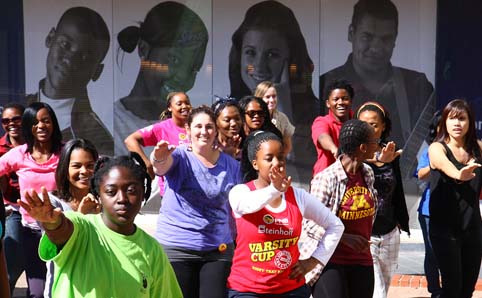 |
|
Students on our Bloemfontein Campus took part in a flashmob at the start of Intravarsity.
Photo: Hannes Pieterse
4 May 2012
|
Photo Gallery
Programme (pdf format)
It is Kovsie against Kovsie today and Saturday, 4 and 5 May 2012, with students from our Bloemfontein and Qwaqwa Campuses competing against each other during Intravarsity.
The inter-campus competition replaces the Intervarsity 2012 programme and will be held on the Bloemfontein Campus. The annual Intervarsity between the Universities of the Free State and North-West (NWU), which traditionally takes place in the third term, has been postponed to 2013.
Students from the two campuses will compete in sports activities like basketball, cross country, netball and soccer. Arts and culture, and leadership events between the two campuses are also planned.
The action started at 14:00 today. At 15:30, residence soccer teams take to the field and later, at 18:40, there is a debating competition.
Saturday’s activities include a leadership breakfast for student leaders and a Wheelchair Rally that takes place in the Kovsie Student Church parking area. The big sporting event for the day is the men and ladies soccer teams from the two campuses taking each other on. The programme concludes with an Intravarsity Music festival starting at 18:30 and continuing until 24:00.
Friday 4 May 2012 has been scheduled as a lecture-free day and Monday 7 May 2012 as a test-free day.